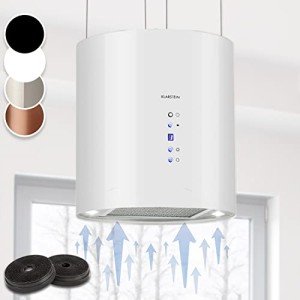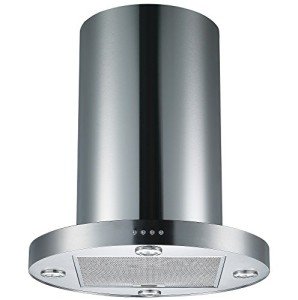
Understanding Island Cooker Extractors: A Comprehensive Guide
In cooking spaces where style fulfills performance, the island cooker extractor has emerged as an essential device in contemporary kitchens. These classy gadgets not just serve a practical purpose in venting out cooking odors and smoke however likewise improve the aesthetic appeal of the kitchen. This article dives deeper into the complexities of island cooker extractors, their advantages, different types readily available, and essential factors to consider to remember when choosing one.
What is an Island Cooker Extractor?
An island cooker extractor is a kind of range hood mounted above a kitchen island kitchen extractor hoods range or cooktop. Its main function is to eliminate smoke, steam, grease, and cooking smells from the kitchen air, producing a more enjoyable cooking environment. Unlike conventional wall-mounted hoods, island extractors are created for setups where the range is centrally situated. They can be found in a variety of styles, sizes, and performances, which adds to their flexibility as a kitchen device.
Secret Features of Island Cooker Extractors
When selecting an island cooker extractor, there are a number of features to think about:
- Size: The extractor should be proportional to the cooking surface area below it. Normally, it ought to be at least as wide as the stove or cooktop.
- Ventilation Type: island cooker extractor Island extractors can be ducted (venting outdoors) or ductless (utilizing filters to recirculate air).
- Suction Power: Measured in cubic feet per minute (CFM), suction power suggests how efficiently the extractor eliminates air from the kitchen.
- Sound Level: This is an essential element for lots of homeowners. Sound is measured in sones, with lower numbers showing quieter operation.
- Design: Style matters! Extractors are available in different designs, including contemporary, timeless, and industrial, permitting homeowners to match their kitchen décor.
- Lighting: Many designs offer integrated LED or halogen lighting to brighten the cooking area.
Advantages of Island Cooker Extractors
Investing in an island cookers cooker extractor comes with numerous benefits:
- Aesthetic Appeal: These home appliances frequently act as a decorative centerpiece, enhancing the general kitchen style.
- Efficient Ventilation: They efficiently remove undesirable smells, smoke, and steam, improving air quality.
- Increased Functionality: With built-in lighting, they can improve presence while cooking.
- Space-Saving Design: An island extractor optimizes kitchen space compared to standard hood designs.
- Customizable Options: Various styles and finishes enable flexibility in matching kitchen aesthetics.
Types of Island Cooker Extractors
Island cooker extractors been available in several types, each dealing with differing user requirements and preferences. Below are the most common types:
| Type | Description | Pros | Cons |
|---|---|---|---|
| Ducted Extractors | Vent air outside through ductwork | Effective odor elimination; less wetness retention | May need installation adjustments |
| Ductless Extractors | Filters air and recirculates it back into the kitchen | Easier to install; no ductwork required | Less reliable in removing smells |
| Integrated Extractors | Developed into kitchen cabinetry | Smooth look; can save area | Requires custom kitchen cabinetry; typically more pricey |
| Wall-Mounted Extractors | Installed against a wall near the cooking location | Versatile setup choices; great for small kitchens | Not as aesthetically impactful as island designs |
Selecting the Right Island Cooker Extractor
When pondering the ideal island cooker extractor, several elements ought to assist your decision-making:
- Kitchen Size and Layout: The general dimension and style of the kitchen will affect the size and kind of extractor required.
- Cooking Habits: Home cooks with regular frying or grilling may benefit from more powerful models, while occasional cooks might go with less robust choices.
- Budget: island cookers extractors can be found in a large range of costs, so establishing a budget is needed.
- Upkeep Requirements: Ducted systems usually need less regular cleaning, while ductless systems need changes in filters.
- Aesthetic Preferences: Consider the style of the extractor and whether it matches existing kitchen components.
Common FAQs on Island Cooker Extractors
1. How high should an island cooker extractor be set up?
The setup height generally varies from 30 to 36 inches above the cooktop, depending upon the manufacturer's suggestions and your cooking routines.
2. Are island cooker extractors loud?
Sound levels differ by model and design. Usually, greater CFM designs can be noisier. Homeowners must examine the sone ranking before buying.
3. Do I need ductwork for my island cooker extractor?
Not always. You can go with ductless models that recirculate air, however ducted models are more efficient for removing odors and wetness.
4. How often should I clean the filters?
For ductless models, it is a good idea to tidy or replace the filters every 1-3 months, depending upon use. Ducted models require routine duct cleaning but normally need less upkeep.
5. Can I set up an island cooker extractor myself?
While DIY installation is possible, it may be suggested to work with a professional, especially for ducted models needing modifications to the kitchen structure.
In conclusion, an island cooker extractor plays a pivotal role in modern kitchen functionality and aesthetic appeals. Using essential ventilation while enhancing design, these appliances are a testimony to how kitchen innovations can blend into our way of lives. With various styles, sizes, and performances offered, house owners are equipped with several options to fit their particular requirements. By thoroughly considering factors such as size, power, and style, one can discover the perfect island cooker extractor that changes both the cooking experience and the total kitchen environment. Investing in the ideal extractor not only elevates your kitchen's look but likewise cultivates a more satisfying cooking experience.
 📌 Guide To Island Cooker Extractor: The Intermediate Guide The Steps To Island Cooker Extractor
🔍 검색
📌 Guide To Island Cooker Extractor: The Intermediate Guide The Steps To Island Cooker Extractor
🔍 검색

